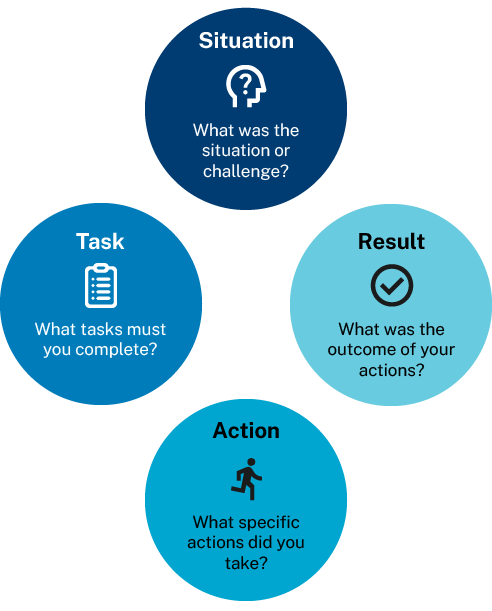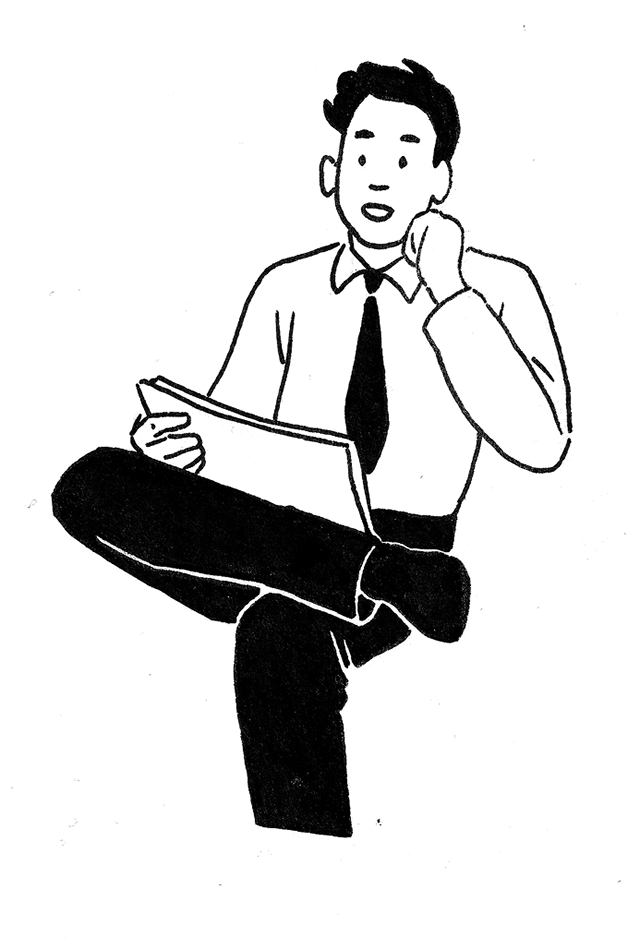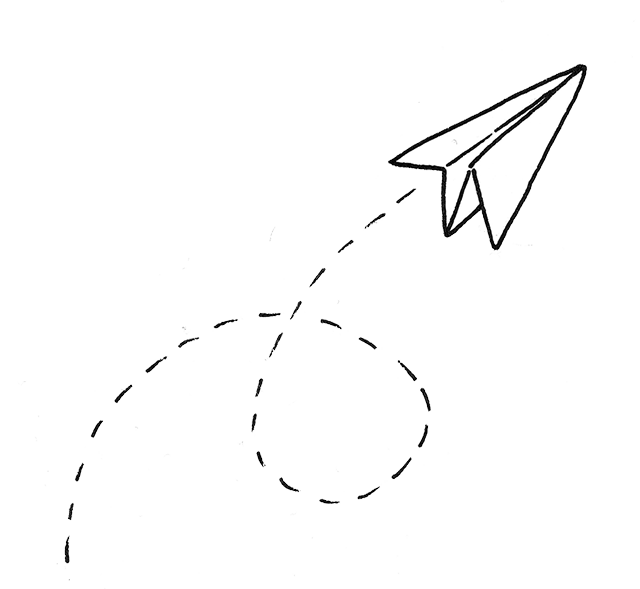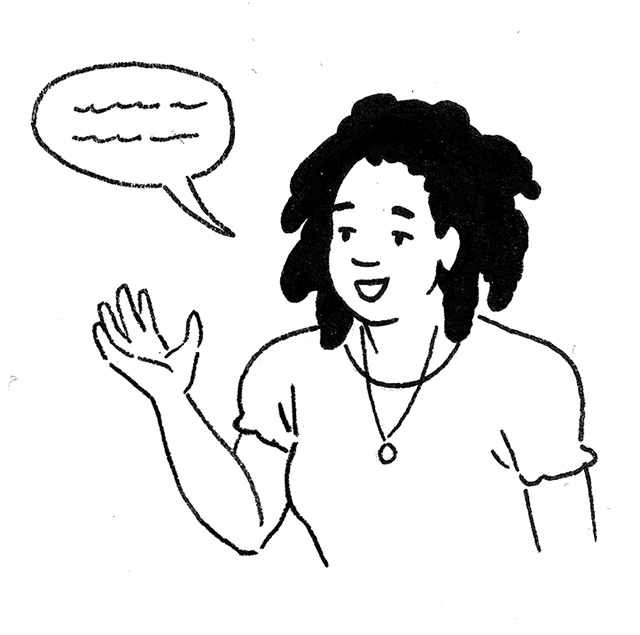The interview process
Understanding the interview process can help you better prepare and present your best self to interviewers.
What is performance-based interviewing?
The U.S. Department of Veterans Affairs (VA) uses Performance-Based Interviewing (PBI) to evaluate candidates in a structured, fair, and experience-focused way. PBI questions measure job-related competencies by asking about a candidate’s behavior in past experiences and/or their proposed behavior in hypothetical situations. PBI is based on the belief that past behavior is the best predictor of future performance.
The purpose of PBI
PBI helps hiring managers assess candidate’s proficiency on the competencies required for the role. These competencies might include leadership, teamwork, flexibility, interpersonal skills, communication, customer service, or decision-making. Questions are tied to job requirements, making them better measures of each candidate’s proficiency.
PBI also ensures consistency and fairness in interviews by (1) asking identical questions to all candidates interviewing for a certain role and (2) using a consistent rating process so each candidate is assessed accurately and fairly. PBI questions are based on a thorough understanding of the job and the competencies that people working in that job need to be successful.
What Do PBI Questions Look Like?
There are two types of PBI questions. Both capture relevant information but ask candidates about their knowledge and skills in different ways.
Behavioral interview questions ask candidates about their past behavior in situations relevant to the current job. They are based on the idea that past behavior in similar situations is the best predictor of future behavior (e.g., “Describe a time when…What happened? What did you do?”).
Situational interview questions use future-oriented questions to ask candidates how they would behave in hypothetical, realistic work situations. They are based on the idea that one’s intentions predict how they will behave in the future (e.g., “What would you do if…?”).

Using the STAR technique
To respond effectively to PBI questions, VA encourages use of the STAR (Situation, Task, Action, Result) method.
PBI questions hinge on a storytelling component to effectively judge a response; you’re pulling from your vast wealth of experience to answer the question. However, you may find yourself tempted to go into greater depth than is warranted to explain a situation. Using the STAR acronym reminds you to focus your answer on the “situation” you encountered, the “task” you were required to complete, the “action” you took, and the “results” of your actions.
SIDE NOTE: STAR is the most common method typically seen in interviewing resources, but other versions of this strategy exist including;
- Problem, Action, Result (PAR)
- Situation, Obstacle, Action, Result (SOAR)
- Context, Challenge, Action, Result (CCAR)
For more help using these techniques, a quick internet search of these terms will provide multiple resources to guide you.
Before the interview
Study the job announcement
Understand the duties, responsibilities, and required qualifications. Make note of the competencies listed—they’ll likely guide the interview questions. Research VA so you have a better understanding of our mission and goals.
Reflect on your experiences
Identify situations from your past jobs, volunteer work, military service, or other experiences where you demonstrated key competencies that match the job requirements or are relevant to VA. Think of examples where your actions led to a successful outcome—or where you learned something valuable from a challenge. Provide responses that highlight both technical and soft skills.
Practice using STAR
Write out a few examples in the STAR format and rehearse your delivery. Practicing out loud helps you feel confident and articulate in the moment.
Prepare logistically
- For virtual interviews: Test your internet connection, audio, and video. Choose a quiet, well-lit space and dress professionally.
- For in-person interviews: Plan your route in advance and arrive early. As with a virtual interview, dress professionally.


During the interview
Stay focused
Listen closely to each question and take a moment to think before responding. Ask for clarification if necessary. Stay on topic and keep your answer structured to have a clear beginning, middle, and end.
Be honest and specific
Use first-person (“I”) statements to clarify your role in the situation. Be truthful, even when discussing failures—what matters is what you learned or how you improved.
Show emotional intelligence
Go beyond technical details. Reflect on how your actions impacted others, how you managed emotions, resolved conflict, or showed empathy. These insights make your answers stand out.
Keep a professional demeanor
Speak clearly, maintain eye contact (or camera focus), and project confidence and enthusiasm. Express your genuine interest in VA’s mission.
Let yourself shine
Be honest but not modest; this is your chance to brag about your skills and accomplishments using specific examples of how you applied your knowledge and skills to various work situations. Teamwork is very commonplace, and most successes are not achieved alone in the modern workplace. Do not flagrantly exaggerate your contributions or claim sole credit for work that was clearly team based.
Ask questions
Come prepared to ask questions; this demonstrates your level of interest and commitment to finding the right role. View the interview as a conversation between you and the interviewers where you’re gathering valuable information to help you make the best career choice possible
Wrap up
Before the interview concludes, touch on any qualifications you didn’t have a chance to discuss and inquire about the next stage in the process. Be sure to thank the interviewers for their time
After the interview
Send a thank-you note
Email your interviewers within 2 days. Express appreciation for the opportunity and briefly reinforce your interest in the position.
Update and notify your references
Ensure your references’ contact information is up to date. Let your references know they may be contacted and share the competencies discussed so they can tailor their responses accordingly.
Be patient
The VA interview and hiring process can take time, ensuring all candidates are evaluated thoroughly and fairly. Human Resources will notify you of the results once a selection has been made.

Example interview questions
PBI questions focus on past behaviors or hypothetical situations that allow candidates to demonstrate their job-relevant competencies. Your responses should describe a specific work or performance situation, the task you were required to perform, the actions taken on your part, and the result of your actions.
The competencies most often cited among VA employees and seen most frequently in job announcements include:
- customer service
- communication
- attention to detail
- interpersonal skills
- problem solving
These competencies are highly likely to appear during an interview at VA. However, applicants should also be prepared to address job-specific competencies and other relevant general competencies listed in the job posting.
Here are two example questions assessing communication skills:
- Describe a situation where you did not communicate well with a co-worker, supervisor, management official or union official. What was the situation? How did you correct it? What was the outcome?
- Tell us about a time you briefed a supervisor or senior management official about bad news and/or results they did not like, along with recommending a different course of action. How did you persuade them to move in a new direction? What were the results?
To illustrate the PBI process, we provide an example behavioral and situational interview question with good and poor responses using the STAR method.
Behavioral Interview
Question: Tell us about a time when you had to deal with an upset co-worker, patient, or other customer. What was the person upset about, and how did you handle it? What steps or actions did you take? What was the outcome?
| Good Response | Poor Response |
|---|---|
| Situation: While working on a group project, a co-worker became visibly upset due to miscommunication and differing expectations about a project deadline. This happened at a critical time in our project and had the potential to jeopardize our team’s progress. | Situation: A co-worker that I was assigned to work with one day was upset about something that happened at work the day before. |
| Task: As a member of the team, I wanted to address the situation in a timely manner, so we could continue working effectively and positively as a group. | Task: My task was to calm them down so that we could work together. |
| Action: I approached the upset co-worker in a private setting and acknowledged the concerns that they had expressed earlier. I allowed them time to vent their frustrations and listened to their concerns. I summarized their concerns and proposed a potential solution to address the miscommunication and get everyone back on the same page. | Action: I approached my co-worker and asked them what was wrong. I tried to explain things calmly in hopes that it would make them feel better. I asked my boss to help as well. |
| Result: The co-worker appreciated that I listened to and validated their feelings. We addressed the differences in expectations and established a better way for communicating in the future so miscommunications would not happen again. By addressing the issue directly we were able to resolve the difference promptly, so it did not jeopardize the project. The solutions we implemented improved our team’s working relationship. | Result: Eventually, they seemed to calm down, and we continued working together for the rest of the day. It was a difficult situation, but I tried my best. |
Situational Interview
Question: A family member approaches you and has questions about the care their loved one received. How would you approach the situation to address their concerns and ensure they feel heard and reassured about the care of their family member?
Competency: Customer Service - Works with clients and customers (that is, any individuals who use or receive the services or products that your work unit produces, including the general public, individuals who work in the agency, other agencies, or organizations outside the Government) to assess their needs, provide information or assistance, resolve their problems, or satisfy their expectations; knows about available products and services; is committed to providing quality products and services.
| Good Response | Poor Response |
|---|---|
| Situation: A family member approaches me with concerns about the quality of care their loved one received. | Situation: An upset family member approaches you about an issue concerning their loved one. |
| Task: I want to make sure the family member feels heard, address their concerns, and ensure them that their loved one is receiving exceptional care. | Task: I want to reassure the family member and resolve the issue as quickly as possible. |
| Action: I would actively listen to their concerns and give them time to express their feelings without interruption. I would validate their emotions and express my understanding for their feelings of concern. I would let them know that we take their concerns seriously and explain relevant protocols regarding care. I would also let them know that we are committed to providing the best care for their family member. I would share their concerns with relevant colleagues and providers, so others are aware. I would follow-up after the conversation to ensure their concerns had been addressed. | Action: I would reassure them that everything is fine and that they should not worry because we provide great care. I would try to redirect the conversation so others would not hear what they are saying. |
| Result: With this approach, I would hope to gain a good understanding of their needs, build trust, and let them know that our goal is to provide their family member with exceptional care. I would know my actions were successful by confirming that the issue was resolved, and their expectations were satisfied. | Result: I would hope to resolve the issue as fast as I could so it did not become a big deal. |

Questions to ask during an interview
If you really want to stand out during an interview, you should also have some questions prepared to ask your interviewer.
Coming to your interview prepared to ask questions demonstrates your level of interest and commitment to finding the right role. While many of the questions you may have will depend on the specific role and responsibilities, here are a few sample questions to help you get started.
- What does a typical day look like in this role?
- This question can give you a better idea of your potential day-to-day tasks and show how you’re considering the smaller details of the position.
- How is performance measured and reviewed?
- By asking this question, you can indicate that you are focused on meeting and exceeding objectives—while also gaining insight into expectations.
- What do you enjoy most about working here?
- This can give you insights into the workplace culture, as well as help you get to know the preferences of someone you hope to work for.
- Do you have any concerns about my experience that I can address?
- By giving the interviewer an opening to address concerns, you give yourself the chance to ensure they don’t go unanswered.
- What are the next steps in the hiring process?
- This question is ideal to ask toward the end of your interview so you know what to expect next.


